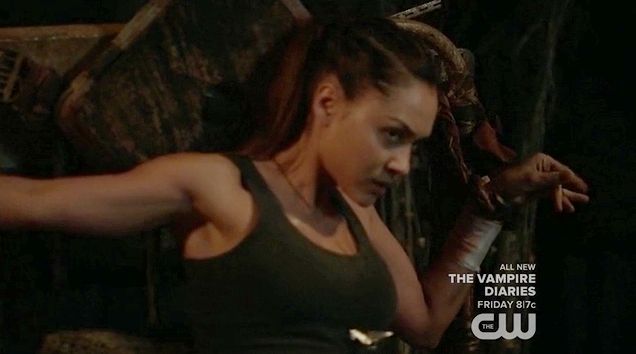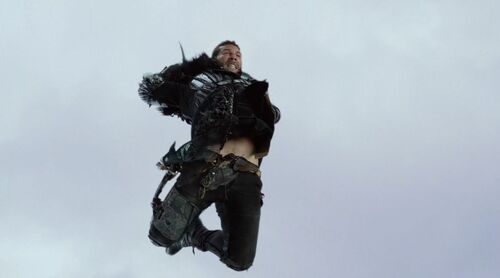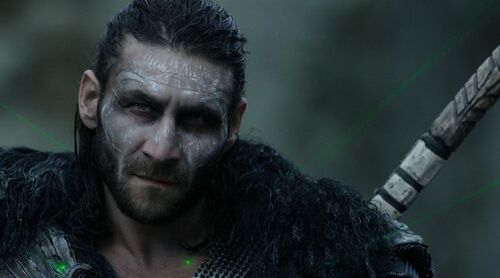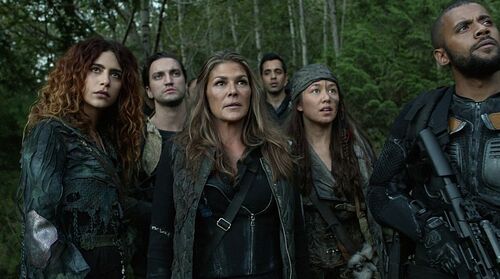
The 100 S3E11: "Nevermore" Review
 Nevermore is one of the best episodes of the season, finally bringing the Delinquent unit back together to save their friend’s life.
Nevermore is one of the best episodes of the season, finally bringing the Delinquent unit back together to save their friend’s life.
There is no doubt that the Delinquents are the heart and soul of The 100. The 100 is, quite literally, their story. The first half of this season focused on the dissolution of this core unit. Clarke, Bellamy, Raven, Octavia, Monty, Jasper, and Miller all struggled with their connections to their world at some level after the events of Mount Weather left them broken. Our heroes ran away, made bad decisions, slid into depression, and sought solace in destructive ways. Several structural missteps made some of the arcs harder to watch than others and also kept all three storylines separate until this episode. That made for a lot of wheel-spinning, but finally, here we are. The storylines are crossing, secrets are being told, confrontations are happening, and the Delinquents are finally back together. Hallelujah! It feels like The 100 again!
TECHNOLOGICAL EXORCISM
Nevermore continues the horror homage with a straight up possession episode. Raven submitted to ALIE last episode (Fallen), and now ALIE has full control of Raven’s brain. The Delinquents + Sinclair work together to remove the chip: Sinclair rebuilds the wristband, Monty and Octavia go to fetch the magnet needed from the Dropship, and Bellamy, Jasper, and Clarke guard Raven.
ALIE and ALIE!Raven’s plan to keep them from succeeding is to try to get them to talk, thus revealing their location so she can send her chipped-zombie horde. The method? Slap at Clarke, Bellamy, and Jasper’s deepest fears and darkest secrets. Raven is the metaphor for all three of Bellamy, Clarke, and Jasper, all of whom hold incredible pain. It’s no accident that those four are chosen for this storyline: all four need to be exorcised of their demons before they’re able to move on.
First up is Clarke. Raven begins in an almost-normal-Raven voice, asking Clarke if she sees the faces of the people she’s killed. Clarke tells Raven that she will never get to her, but the truth is that Clarke is a raw nerve who hasn’t dealt with any of the loss or death in her life. ALIE!Raven brings up Finn, snarks that Clarke got Lexa killed, and then goes in to the cut that hurt the deepest: that Clarke was responsible for her father’s death on the Ark.
This is as close to seeing Clarke Griffin lose it that we have ever seen. Yes, she walked off and lived in the woods for three months and then stayed in Polis as long as she could—but those were all methods of running away. Nevermore confronted Clarke not only with her decisions, but with her anguish over what she’s done and who she has become. Jasper called her Angel of Death last episode. Niylah greets her as Wanheda. ALIE!Raven says she’s the Commander of Death (and taunts Bellamy with that, too). None of her pain is concealed. She thought it was; she thought she could immediately slip back into the role of Clarke, Delinquent Co-Leader. She couldn’t. She lost it immediately. However, by the end of the episode, after successfully exorcising Raven and apologizing to Jasper, we see Clarke begin to restore herself when she and Bellamy talk about being (or not being) “the good guy.”
Jasper is the next to meet ALIE!Raven’s vitriol, and he’s just as easily dealt with as Clarke. His pain, like hers, is right at the surface. He and Raven have been suffering the most visibly this season, and even though he was tempted to take the chip, he never did. However, he also hasn’t found a path through his grief yet. ALIE!Raven presses on this by calling him out on being selfish and a coward. These aren’t totally true statements—Jasper is the hero who got Raven out of Arkadia, after all—but they are exactly the thoughts that people with depression struggle with. To have them aired in front of Bellamy, in a room where everyone can hear what is happening, is hurtful and humiliating. He snaps, and Bellamy convinces him to go outside.
Bellamy, however, proves harder to break. ALIE!Raven’s opening gambit is taunting him with their one-time sex. Bellamy fidgets, but gives nothing away. Then she goes for the genocide at Mount Weather, his part for the Culling on the Ark, how he was the one who got Octavia found out which got their mother killed. He’s restless and doesn’t meet her eyes, but he also doesn’t say anything either. Then ALIE!Raven brings up how Bellamy isn’t a leader, he’s a follower, the knight to Clarke’s queen. Clarke has only been back one day, and he’s already following orders. There is an interesting side cut to Clarke at this point, looking devastated over this information. But ALIE!Raven isn’t done. She goes in for the kill: if only Bellamy had been as devoted to Gina, maybe Gina would still be alive. This is where Bellamy breaks by telling her, “You don’t know what you’re talking about,” but the very act of him finally speaking tells us that well, maybe she does. It’s the show putting a giant pin in the issue of Bellamy and Clarke’s leadership dynamics and saying: we’re coming back to this. Frankly, I can’t wait.
Niylah, however, overhears ALIE!Raven taunt Bellamy with the Grounder massacre at Arkadia—in which her father died—and she runs in and slaps him. ALIE!Raven sees her, and now time is up. They have to get the chip out of Raven.
RESETTING THE MORAL COMPASS: MONTY & OCTAVIA
Monty and Octavia have the B-storyline this week. To make the wristband work, Sinclair needs a magnet from the Dropship. Monty and Octavia take the Rover to go fetch it.
Monty, having overheard a conversation between Bellamy and Octavia, asks her if she’s really going to leave. She says yes, she doesn’t belong. He tells her that she’s a part of the hundred—to which she responds, not anymore.
Octavia, in that moment, is a woman without a people. She hates her brother. Her mate is dead. Sky People have done nothing but oppress her, and the only Grounder besides Lincoln to accept her is Indra, and Indra is gone. Octavia has always been a character that sees no moral gray area, and thus everyone who she has called ‘family’ or ‘friend’ is tainted in a way she finds unbearable. She must go.
When Monty comes out of the Dropship, Octavia is gone, but his mother is there. Hannah is clearly ALIE-chipped, and tries to physically force Monty to take the key so ALIE can find out where they are. Octavia magically reappears, and tries to take on Hannah herself. But Hannah’s major advantage here is that she can’t feel pain due to the ALIE-chip (and also is a secret badass—but okay). Just as Hannah is about to kill Octavia, Monty draws his gun and shoots Hannah in the shoulder. It has no effect. He shoots her again, and she dies.
It’s a tragic scene, incredibly performed by both Christopher Larkin and Marie Avgeropolous. In a way, this scene fits in with several other scenes this season that fall under Did this really have to happen? Honestly, I don’t know. Monty could have tackled her. They could have overpowered her, gagged her, kept her alive since they both knew they were working on a solution.
So what does killing Monty’s mom do for the narrative?
One, is that it complicates both Monty and Octavia, both viewed as moral compasses by the audience. Monty has already had this layering added to him by engineering the genocide at Mount Weather and siding with his mom and Pike, but fan reaction views him as being "good" and having integrity. Placing him in a situation where he choose to kill his mom complicates that picture. Also, interestingly, it sends him down a similar road of grief as Jasper. What will he do with the knowledge that he could have potentially saved her?
Octavia especially plays the role of rigid Justice, the holder of the scales. Complex issues are sometimes frustratingly right/wrong with her. But now Monty killed his own mother to save her—something she condemned Bellamy for doing at the beginning of the episode when she accused him of only turning on Pike to save her, not because it was the right thing to do. Well, Octavia, what is the right thing to do when your life is on the line?
Bellamy, Lincoln, Clarke, and now Monty have all, in some ways, spared Octavia from having to compromise her morality and sense of justice. But after Monty killed his mom in front of her, that’s no longer possible for her. She has to choose—either live in a complicated world with complicated people—or try to find…something else.
Second, having Hannah show up alone, outside of the chipped-zombie horde of last week, reinforces ALIE’s power. We've seen that she has special use for some individuals, like Raven and Jaha, but showing her individually activate a person from the Arkadia mob and send them to do her bidding is downright terrifying. Hordes are scary enough, but so are singular people who have a vast synaptic network at their disposal, who are being fed almost omniscient information by ALIE. Hannah showing up cues the audience into this, but so does showing that she is relentless in the pursuit of her objective. That’s the kind of danger lurking in the woods that is frightening and exciting storytelling.
Finally, killing Hannah serves to further isolate the Delinquents. Week by week the parent figures are being disposed of: Kane is in Polis with Pike, Abby is ALIE-chipped, Lincoln, Lexa, and Hannah are now dead. Even Murphy lost Emori, his only real ally. Watch out, Sinclair (please no!). Now, in the face of this looming evil, they are really all alone.
In the end, it’s Octavia echoing Monty’s words that rally the Delinquents together. “We survive together,” she tells Jasper, Sinclair, Raven, Monty, Bellamy and Clarke. They each nod back to her. It’s clear that she’s chosen her people, and they’ve all chosen each other.
RESPONSIBILITY AND APOLOGIES
Season three of The 100 has been about many things, but as we kick into the back half the main themes are becoming more cohesive. How do we face pain and suffering? Do we run from it? Do we face it? Part of the reason the first half of the season has been so frustrating is because we’ve seen our heroes try to escape it in anyway they can, and hey! That’s not what heroes do!
Why is Clarke so passive? Why is Bellamy so aggressive? Why is Monty following his mom? Why is Jasper drinking so much? Why did Raven take that damn chip?
On a narrative level, some of the stories were more successful than others. But the themes are clear, and as we turn the corner towards the end, The 100’s thesis is starting to bubble to the top. For one, Jasper, afflicted by grief and PTSD that he can’t escape, becomes the hero of Fallen. In Nevermore, even though he is triggered by both Clarke and ALIE!Raven, he still helps Raven as much as he can. The 100 is showing that even in the middle of depression and grief, when you feel like the coward ALIE!Raven accused Jasper of being, you are and can be a hero. That’s powerful messaging, and one of the most successful story arcs of The 100 this season.
But in a season about pain and grief, it would be one sided to only talk about internalized suffering. The truth is that sometimes, when people are hurting, they lash out (like Octavia beating Bellamy to a pulp). They make hurtful choices, even if those choices are things that they need to do (like Clarke irradiating Mount Weather, thus killing Maya). Other people, their wellbeing and their lives, are collateral damage. How do people begin to make that right?
By accepting responsibility and apologizing.
Apologies have come in various contexts this season. Lexa apologies to Clarke, telling her, “I’m sorry. I never meant to turn you into this.” In Hakeldama, Clarke apologies to Bellamy for leaving—only just realizing incredibly hurtful that was for him. He apologized to her, too, and then slapped handcuffs on her wrists. Whether any, or all, of those were sincere is up to the viewer.
However, accountability and apology were underlying themes of this episode that fleshed out the narrative. First, the Delinquents force their way into Niylah’s trading post and home. They don’t ask, they just do it, and Clarke goes “trust me on this” route when talking to Niylah. Niylah isn’t buying it, and at the end of the episode, calls Clarke out. By always overriding people, Clarke doesn’t give anyone—herself included—a chance to see what others are capable of, for good and bad. Niylah doesn’t accept her apology.
Just like Jasper doesn’t accept her apology, either. Jasper corners Clarke after ALIE!Raven emotionally flayed her. “Truth hurts, huh?” he sneers. He’s provoking her, like he’s done to all of his friends. Instead of lashing out at him, Clarke says, sincerely, “I’m sorry.” It’s a true apology—she’s accepted her part in his pain. He still responds with, “Shove your regret up your ass,” and stalks out of the room.
The third rejected apology: After ALIE!Raven spills the beans about Bellamy being involved in the Grounder massacre, he goes outside to kick some barrels/hit some fencing, and Niylah confronts him. “Did that make you feel better?” she asks. He tells her he only wanted to protect his people, which she counters with, “By destroying mine?”
Bellamy is being faced with the embodiment of his bad decisions. He hurt this woman; he participated in an event that got her father killed. What do you do? What do you say? Like Clarke, all he says is: “I’m sorry.”
It’s not enough.
“People like you always are,”she says. Niylah is not condemning just Sky People, but people who lash out in violence, who hurt others out of fear. It’s an excellent moment of accountability for Bellamy, who, after all, saved Niylah’s life in episode two. Even though he doesn’t know her, they share a history, and she shows him the truth in a way no other character in that moment could. It’s an elegant bit of writing.
The 100 is going for hard truths here, and that is that sometimes "I’m sorry" isn’t enough. Sometimes, "I’m sorry" is just a promise, because an apology without reconciliation means nothing. Bellamy and Clarke in this episode both said their apologies to people they harmed. Through Lexa, The 100 has already said that vengeance (blood must have blood) isn’t the answer. Now they’re also saying that just the words I’m sorry aren’t justice. So what is?
REVIEW
Nevermore is a tour-de-force of an episode, from the first second till the last. The cast is excellent, capped off by incredible performances by Lindsey Morgan, Erica Cerra, and Christopher Larkin.
A huge standing ovation to both Lindsey Morgan and Erica Cerra, whose performances undulated from creepy to ruthless to terrifying. Cerra has been putting in a calculated and poised performances as ALIE all season long, and keeping that up in the middle of the chaos that is Nevermore must have been quite a challenge. Her ethereal and considered aura never faltered, and gave perfect form to the “demon” inside Raven’s head. Lindsey Morgan nailed intense tonal shifts—sometimes within seconds of each other—with dramatic precision, switching from ALIE!Raven to a DarkRaven!ALIE to finally, amazingly, just Raven at the end. The sheer physicality of this episode only enhances an awesome technical job. Well done to both of them.
Christopher Larkin has always been a solid performer in The 100—several of my favorite moments in the show involve Monty. This episode showcased his talents. He played Monty’s fear, horror, and shock with a palpable devastation. We saw all of Monty’s history in that moment he, screaming, shot his mom. I was shattered for him by the end. That is due to Larkin’s performance, and I hope that going further we get to see Monty really dig into this pain, because Christopher Larkin can definitely pull it off.
Nevermore is a return to what makes The 100 special. In an overpopulated landscape of dark and violent TV shows, The 100 has always managed to make the stakes and the consequences feel authentic. Not just personal, but intimate. Nevermore brings all of the events and decisions that have formed this group back to the forefront and leeches all of the pain for us to see. At the end, as they closed up the Rover and drove away, it finally felt like The 100 that we all know and love is back.


